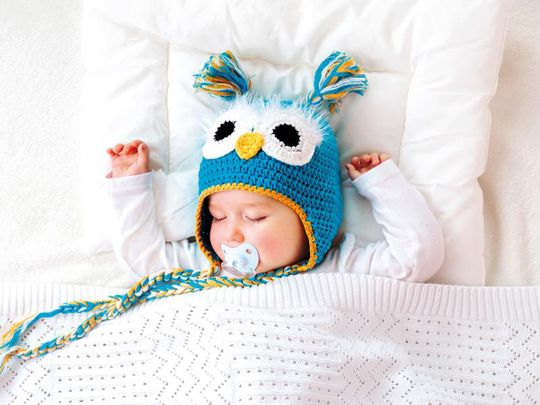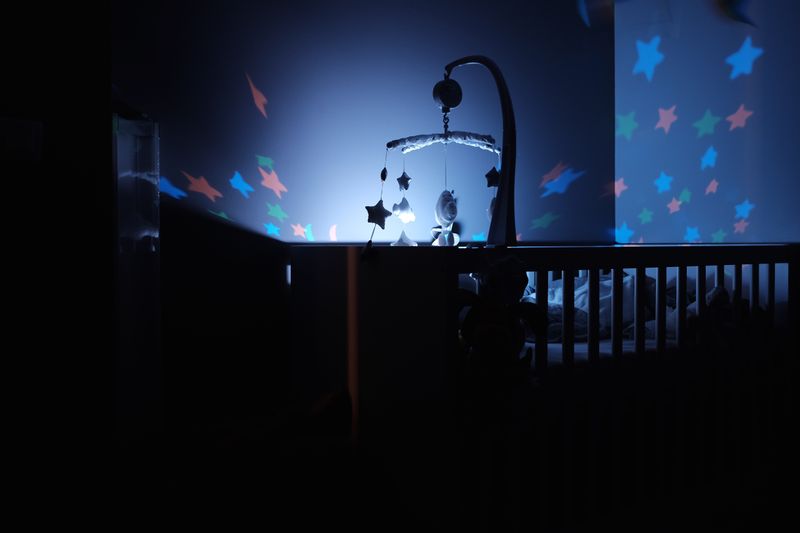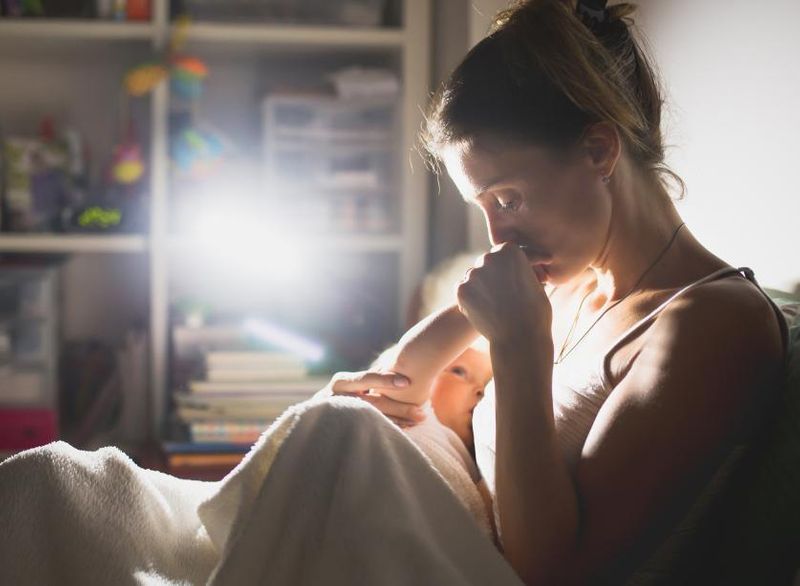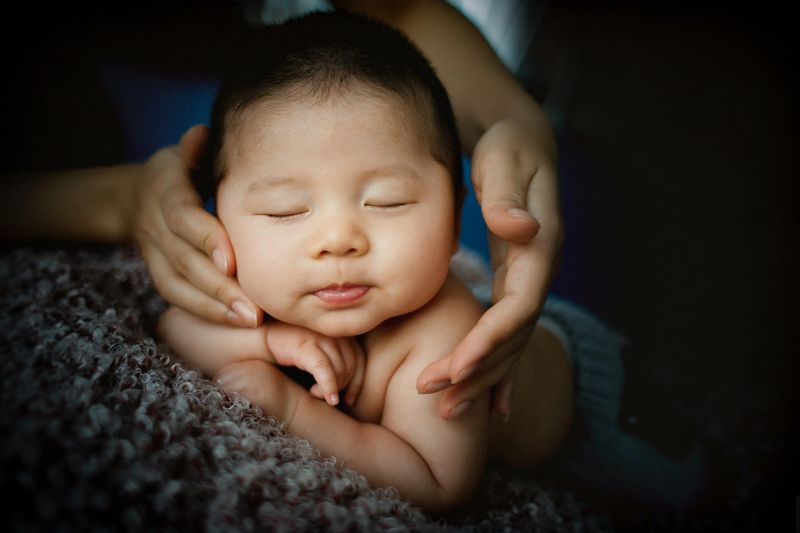
Let’s face it, parents spend a lot of time obsessing over sleep. Is your baby getting enough? Are they napping too much? But it turns out there is a scientific reason that your little one is in the mood for a 3am party while you can barely keep your eyes open long enough for the moonlight feed.
Babies operate on a sleep pattern that is completely different to an adult sleep pattern. “Unlike an adult’s sleep cycle, which is 90 minutes, a baby’s sleep cycle for the first six months will be approximately 45 minutes,” explains Julie Mallon, a UAE-based sleep consultant with Nurture to Sleep (nurture2sleep.com).
“For the first three months, babies are also unable to distinguish between day and night and so parents must begin to rely on two sleep mechanisms: a baby’s circadian rhythm and sleep pressure [the drive to sleep] to help their child fall asleep.”
And just to make things even more confusing, an infant’s sleep pattern will change dramatically during the first year of their life. “Throughout the first year of your baby’s sleep journey, it is important to establish a gentle sleep routine, but also to be aware of the developmental leaps, which will explain changes in behaviour and sleeping patterns,” adds Julie. Thankfully, our sleep experts are here to decode exactly how much sleep your baby needs for optimum development at each age and stage so that you can all rest easy...
How much sleep babies need at every age

0 to 12 weeks
Sleep required: “Newborns need from 14-17 hours of sleep, but rarely in long segments. They’ll need to feed every 1-3 hours and sleep every 1-2 hours,” says paediatric sleep consultant Lucy Wolfe, author of The Baby Sleep Solution.
Potential challenges: “Learning to read your baby’s body language for sleep and helping them sleep before they get overtired,” says Lucy. Aside from tiny yawns, look out for them pulling at their ears, closing their fists and their eyes glazing over/ staring into the distance,
Developmental milestones: “The early weeks post birth can be erratic and draining. The main focus should be on making sure that you meet baby’s needs and not on any concerns about ‘bad habits’.”
Top tips: “A good start is to aim for a flexible feeding and sleeping balance to the day, with a wake time ideally no later than 7.30am and always with a feed,” says Lucy.

12 weeks to 6 months
Sleep required: Roughly 12-15 hours (3-5 hours day time, 7-10 hours night time)*, although unlikely to be all in one long stretch and will probably be broken up with feeds.
Potential challenges: “The ‘4-month regression’ can appear now and by 16 weeks neurologically the character of sleep locks into place and many report that whatever progress they have made is lost! Don’t worry it will regroup, but you may need to make adjustments,” says Lucy.
Developmental milestones: Melatonin plays a key role in regulating our body clocks, but babies only start producing it at around 12 weeks, according to gentle sleep expert Sarah Ockwell-Smith. This can therefore be a good time to try and encourage a more regular routine.
Top tips: As sleep times may begin to be more organised, at this point you can aim to regulate day time naps into a morning, lunchtime and afternoon rest.

6 months to 9 months
Sleep required: “The total sleep requirement for this age group is 12-14 hours, including just over three hours of day time sleep,” says Nurture to Sleep’s Julie Mallon.
Potential Challenges: “There are a number of factors which can affect a baby’s sleep at this time, namely teething and the onset of separation anxiety which can result in big disruptions of sleep.”
Developmental milestones: “This is a time for huge steps in gross motor development and many parents notice sleep disruption around these developmental milestones. There are also a number of studies which confirm that when babies are learning to crawl they have a harder time learning to fall asleep and stay asleep,” says Julie.
Top tips: “Sleep is not intuitive; it is a skill, which is learnt behaviour. With consistency, persistence and gentle behaviour modification, your child will learn the skill of falling asleep and staying asleep when given the opportunity,” says Julie.

9 months to 12 months
Sleep required: 11-14 hours (1.5-2 hours day time, 11 hours night time)*
Potential challenges: “This is often described as the ‘Pre-toddler stage’ as your baby will start to shift from baby to earlier toddler behaviour,” says Julie.
Developmental milestones: “At around 10 months, your baby can start to develop very strong emotions and separation anxiety. The emphasis here is when a child is experiencing separation anxiety is to be responsive and flexible to your child’s needs. Research shows that when a family can be more flexible and responsive during a time of regression the child will adapt more quickly to the change and sleep is not as disrupted as anticipated.”
Top tips: “In terms of sleep tips, one of the most important is routine, routine, routine. This will help establish when a baby eats and sleeps. It does not need to be rigid but when there is structure and predictability we move out of fright, fight and flight mode and allow our bodies to rest. Our children do the same,” says Julie.
*Sleep Requirements Supplied by The National Sleep Foundation
2. Identify what your baby’s “sleep prop“ is and if it is sustainable at 3am. “White noise is a healthy, positive sleep association. However, if their sleep prop is you patting or rocking, gradually you will need to teach your baby how to sleep without this prop,” says Julie.
3. Watch your baby’s “wake window”. “On waking from a nap if they appear overtired the likelihood is you have missed their wake window” and next time place them for their nap earlier.”

TIME TO CALL IN THE SLEEP CONSULTANTS?
So what do you do if you’re an exhausted parent struggling with a child’s multiple wakings in the night? With conflicting advice online, many UAE families today are turning to the experts.
These sleep consultants, or ‘sleep trainers’ as some of them are known, will provide (for a fee) home visits, and/or telephone and WhatsApp support for parents who are desperate to get back to some sense of normality overnight.
A modern phenomenon
Although kids have been waking their parents up since the caveman days, sleep coaches are a relatively modern phenomenon – a global survey of sleep consultants from 2016 found that most of them had been practicing for a median of four years.
Behavioural sleep problems are very common, can have serious consequences for family and baby, and usually respond well to interventions. But there are few paediatricians or psychologists who are certified in sleep medicine - and they rarely have the time to dedicate to the intricacies of a child’s individual sleep pattern. Sleep coaching has emerged as a service to fulfil this need for families struggling with sleep troubles.
The sleep spectrum
Although the demand for sleep coaching is growing, there is no one set of guidelines for exactly what constitutes a provider.
Depending on your needs and preferences, these slumber saviours can provide you with anything from a detailed daily sleep routine for your baby with minute-by-minute instructions, to a more hands-off form of sleep coaching and moral support for you as the parent.
But not all sleep consultants are created equal. Many come from contrasting realms of thought, with a range of different approaches. At one end of the spectrum are the sleep trainers, who advise a methodical, disciplined approach that may or may not involve some element of the controversial ‘cry it out’ method (whereby babies are left for certain periods of time to cry, with the idea being that it helps to teach them to self-soothe). And at the other end of the spectrum are the ‘gentle sleep’ coaches, who would never dream of you leaving your baby to cry, but rather support parents in forming a sleep strategy that is in line with their intuition.
Shh, we’ll let you in on a secret...
There is no right or wrong when it comes to a parent’s preference for their baby's sleep, and there is certainly no one approach that will fit every family or every baby.
Here, we speak to two UAE-based sleep consultants who have quite different approaches, but agree on one thing: babies aren’t actually supposed to sleep through the night…

“Night wakings aren’t a problem to be fixed”
Dubai-based British expat Hayley is an Infant Sleep Educator known as The Gentle Mama (thegentlemama.com). She says that parents need to reframe how they see their baby's sleep habits…
“Many 'sleep experts’ label night wakings as a problem to be fixed. As an Infant Sleep Educator my priority is to provide parents with accurate, evidence-based information about biologically normal infant sleep, so that they don’t feel the need to take drastic measures unnecessarily.
Babies need help to self regulate
“Research shows that night waking is part of normal sleep for both infants and adults. As adults we generally don’t remember our wakings, and fall back to sleep easily, as we are able to self-regulate.
“Babies, on the other hand, are neurologically incapable of self- regulating, and instead need the support of a caregiver to meet whatever need they’re waking for (co-regulation). Essentially, whereas we can take a sip of water, adjust the covers or calm ourselves down after a nightmare, babies need support with these simple acts.
Sleep patterns change as your baby grows
“Linking sleep cycles for an entire night happens at a different time for each baby/toddler. Responding reliably at night helps babies develop healthy, independent sleep as it builds the baby’s emotional system so that they can self-regulate.
“Night wakings vary from night to night and month to month, and this is also healthy and normal. You may find that at 4-6 months, 9-11 months , 18 months and 24 months, night wakings increase. This is due to progressions in your baby’s development (when babies are learning new skills or on a growth spurt it can affect their sleep). Sleep trainers often refer to these as regressions, whereas in fact your baby is taking a step forwards, not back.
Where does your perspective come from?
“Instead of seeing your baby’s wakings as a problem, consider where this perspective has come from. Is it due to misguided social pressure? Advice from ‘sleep experts’ who are prioritising consolidated sleep over healthy development (consolidated sleep is not necessary for healthy development)? Or due to your own exhaustion at this intense stage of parenthood?
Getting to the root of the problem
“If tiredness is a key factor, consider looking at ways to tap into your support network/fit self-care into your week. This can make all the difference without having to take drastic measures. If misguided advice from a ‘sleep expert’/peer/family member is to blame, try to focus on being as researched and informed as possible, in order to make decisions YOU feel comfortable with. No one knows your baby better than you, and any decisions you make need to be ones you feel fully comfortable with.”

“Your baby will never sleep through the night”
Sara Elamory is a Dubai-based Pediatric Sleep Consultant and founder of Sleep Train Me (www.sleeptrainme.com) says it’s about babies getting back to sleep on their own, rather than sleeping through the night…
"Firstly, I feel parents need to understand this...Your baby will never sleep through the night.
"That’s right! We human beings sleep in cycles, which vary from light sleep to deep sleep and back again. For babies who are used to being rocked, bounced or nursed to sleep, waking up in the night require external help to get back into a peaceful slumber.
"Hence baby never sleeps through the night. Now the real question is “When will my baby be able to get back to sleep on their own?” Simply, this will happen when they learn how. Teaching your child great sleep skills isn’t a one-night operation. It takes some time, a lot of repetition, and plenty of discipline on the part of the parents. For those of you who are desperate for just a little bit of relief, these tips should help you and your little one get a few more hours of shut-eye, starting tonight.
1. Hello darkness
Melatonin production is triggered by darkness, start turning down the lights an hour before you put baby down. For babies who wake up early, invest in some blackout blinds.
2. Turn down the heat
Babies are like grown ups, sleep best when they’re warm and snuggly inside of a cool environment. A warm nighttime onesie and a cool nursery is the best way of ensuring baby remains comfortable through the night.
3. Keep it boring
We all love the look of a cute, elegant mobile over the top of baby’s crib with special sounds and light, but even though they may seem soothing to us, they can be a real source of fascination for your little one, which is great! Just not when they’re trying to sleep. The more boring your child’s bedroom is, the better they’ll sleep.
4. Be predictable
A well-planned, consistent bedtime routine is conducive to a good night’s sleep, particularly with babies. Once their bodies and brains start to recognize the signals that indicate an upcoming bedtime, their energy levels will start to wind down, melatonin production will kick in, and muscles will start to relax. So by the time you’re giving them a goodnight kiss, their system should be all set for a long, restorative sleep.








